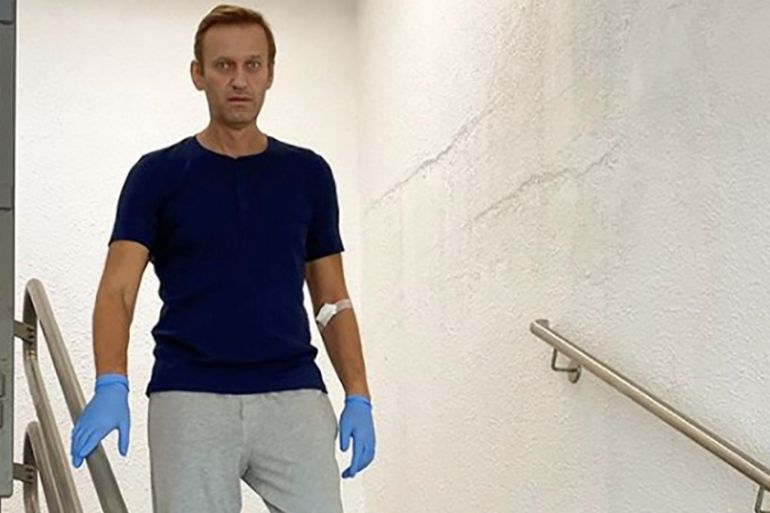Alexey Navalny released from German hospital after 32 days

The German hospital treating Russian opposition leader Alexey Navalny for poisoning said on Wednesday that his condition has improved enough for him to be released, and suggested a “complete recovery” from the nerve agent was possible.
Navalny, 44, spent 32 days in treatment in Berlin’s Charite hospital, 24 of which were in intensive care, before doctors deemed his “condition had improved sufficiently for him to be discharged from acute inpatient care”.
Keep reading
list of 4 itemsNavalny posts Instagram photo of him walking down stairs
Russian Novichok scientist apologises to Navalny
Navalny demands Russia return clothes worn during ‘attack’
The hospital said that based on Navalny’s progress, treating physicians believe that “complete recovery is possible,” but added that it “remains too early to gauge the potential long-term effects of his severe poisoning”.
Navalny, the most visible opponent of Russian President Vladimir Putin, was flown to Germany two days after falling ill on August 20 on a domestic flight in Russia.
German chemical weapons experts have determined he was poisoned with the Soviet-era nerve agent Novichok – findings corroborated by labs in France and Sweden.
In his first blog post since emerging from a coma, Navalny said on Monday that the three European labs had found Novichok “in and on my body”.
He noted that Russia had still not opened an investigation but that he “did not expect anything else”.
Navalny aides said on Thursday that German experts found Novichok on a water bottle taken from the hotel room where he stayed before being taken ill.
The bottle appears to have been key evidence for Germany’s conclusion that the 44-year-old lawyer and outspoken critic of President Vladimir Putin was poisoned with the military-grade nerve agent.
It was the same class of Soviet-era agent that Britain said was used on former Russian spy Sergei Skripal and his daughter in Salisbury, England, in 2018, and Chancellor Angela Merkel and other world leaders have called for Russia to fully investigate.
Navalny was kept in an induced coma for more than two weeks as he was treated with an antidote. Members of his team accused the Kremlin of involvement in the poisoning, charges that Russian officials have vehemently denied.
Russia has bristled at the demands for an investigation, saying it needs Germany to share medical data or compare notes with the Russian doctors who said they found no trace of poison in his system while he was at a hospital in the Siberian city of Omsk.
Germany has noted that Navalny was in Russian treatment for 48 hours, and that Russia has its own data.
Germany has also enlisted the Hague-based Organisation for the Prohibition of Chemical Weapons for technical assistance in the case.
Last week, the international agency said its experts had “independently collected biomedical samples from Mr Navalny for analysis by OPCW designated laboratories”.
Results have not yet been announced.